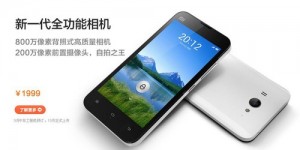 Chinese handset maker Xiaomi, which has built up an enthusiastic following in its home market by undercutting rivals’ prices and while only selling online, plans to try exporting its disruptive business model to other Asian markets by the end of this year.
Chinese handset maker Xiaomi, which has built up an enthusiastic following in its home market by undercutting rivals’ prices and while only selling online, plans to try exporting its disruptive business model to other Asian markets by the end of this year.
Xiaomi CEO Lei Jun said the company had its sights on markets neighboring mainland China, such as Hong Kong, Taiwan and Singapore, for its first forays outside the country. Its long-term goal is to be a global company, Lei said at the Global Mobile Internet Conference in San Jose, California.
Xiaomi was founded in 2010 and is set to ship its second handset, the M2, by the end of this month, Lei said. It will be priced at 1,999 yuan (about US$320), less than half the price of smartphones from Apple or Samsung in China. Xiaomi sells its phones in online auctions and counts on its customers to spread the word about the brand through social networking. That strategy has generated a loyal fan base, as seen when the M2 was announced to wild applause in August in Beijing. Its fans’ enthusiasm has led observers to draw comparisons to Apple.
Countries where Xiaomi can succeed need to have well-developed social networking and e-commerce platforms, Lei said through an interpreter during a press conference at GMIC. The growing adoption of smartphones has driven Xiaomi’s success and will be the biggest trend in mobile over the next year, Lei predicted. He said smartphones has made up half of the 400 million handsets that have been sold in China this year.
Though it prices its phones well below competitors, Xiaomi builds them with name-brand components from suppliers including Qualcomm, Sharp and Hitachi, which helps to build consumer confidence in its brand, Lei said. The company is breaking the mold in software as well, with weekly updates of the software for its phones. It releases a new version every Friday at 5 p.m. and has been doing so for 110 consecutive weeks, Xiaomi President Lin Bin said during a panel discussion at GMIC. The company’s phones run a custom OS called MIUI, which is based on Google’s Android.





